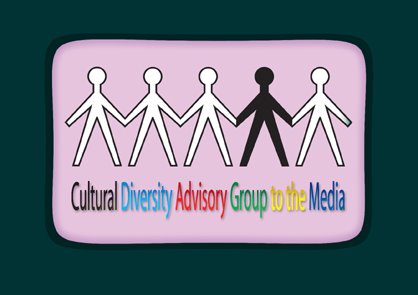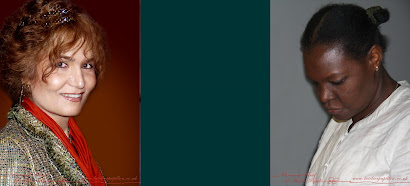When I spoke at the launch of Anver Jeevanjee’s book, Diversity in the Media, in July, I was simply speaking extemporarily. So what follows isn’t the text of what I said then, but some thoughts on the media’s portrayal of the diverse community we live in, and why solving some of our problems has proved so difficult.
I sat down the other day in the sunshine on the South Bank outside the The National Theatre. The flagged forecourt has been covered with artificial turf, There’s a variety of garden furniture – deckchairs and the like – some giant hedges you can climb on and a background of eclectic music. There were a few lovers laying on the grass, some older couples, and individuals, who like me, nursed a cup of tea and blinked happily at the prospect of not having much to do for the next 20 minutes or so. A small girl of maybe 8 was doing cartwheels and backflips in front of her family. A few kids with ice creams. One or two people buried in books. An elderly couple, Indian I think, taking the weight off their feet. A young black guy, who’d emerged triumphant from the box office to his girlfriend. £1.50 it cost me to be part of a very pleasant, utterly modern English occasion. We don’t always seem to do inclusion so well.
On the other hand, I wonder if you looked hard, would you discover that this too was a segregated occasion. After all, who gets a cup of tea at the National Theatre? Who feels at ease plonking themselves down in that sort of artistically contrived space? Who buys NT tickets and waves them at his girlfriend?
This thought was in my head probably as a result of Samir Shah’s lecture to the Royal Television Society earlier this year, but a lot of other people have been thinking it too. For some years the talk in political circles and in universities seems to have been dominated by gender or race; there doesn’t seem to have been much room for thinking about class in our new meritocratic Britain. As a consequence, it has become quite hard until recently to suggest that the fortunes of most people could be limited by their origins. But there’s growing evidence to suggest, for instance, that the most excluded group in Britain are low income, white men, so it’s worth asking the question, as Shah did, If most Afro-Caribbeans arriving in the UK in the fifties did so as members of the working class, was their route to prosperity and equal rights any different from other members of the working class at the time? Of course, they faced nasty, crude racism, too, and because that was so obvious and urgent, we may well not have realised they faced another prejudice as well, one they shared with a large number of indigenous British people, and one that was all the more damaging and hard to fight because it was and is unseen.
Samir Shah makes this point, while arguing that 30 years of equal opportunities, tick-boxing, diversity initiatives and so on have had no effect at all in the Media. Well, up to a point. Portrayal – the sound of diverse voices on the radio, and the sight of black and brown faces on screen – has changed. Shah thinks it’s been overdone. He thinks black and brown people being introduced into TV drama with artificial scripts and plotlines is damaging; it looks like propaganda. I’m not qualified to have a view on that, but I don’t agree with him as far as news is concerned, which is the bit of the media where I work. In news it could well be true that a bright, attractive person from a diverse background will have the edge over someone from a white one. here’s a statistic that doesn’t prove it conclusively, but is suggestive: in English Regions – the quite big bit of the BBC that runs regional TV, radio and online up and down the country – the rate of turnover of staff is 10%. But if you look at just BME staff, it’s 20%, and they aren’t leaving the industry; they’re moving on up.
If that’s a sign of a kind of positive discrimination at work, you might ask if it’s a bad thing. I can remember, for instance, when it was all but unthinkable to have women in a newsroom, and the few that did make it, were treated as honorary men. There was one in the first newsroom I worked in – she was nicknamed Vic, because you had to be a bloke to be a journo. All in fun, of course. Now no one bats an eyelid at women reporting from all over the world, from war zones, as specialist correspondents; the Head of all BBC TV is a woman, so is the Controller of BBC1, and of the BBC’s most popular radio station, Radio 2. More than half of the BBC’s journalists are women. Equally, I think it’s great that someone like George Alegiah or Trevor MacDonald can emerge as trusted people, trusted for their integrity and journalism. Their colour is unremarkable because, in a world where there are a lot of black and Asian reporters and presenters, there’s nothing particularly special about it. What matters is the story, and how well and professionally it’s handled.
Where Shah is right is that the boards of the big media companies, and the BBC is one of them, have remained completely white. But suppose this isn’t because of racism, but about how class still works in a supposed meritocracy. Actually, I don’t think there’s the slightest hint, not a breath, of racism amongst the BBC’s top management. Quite the reverse. They are, as Shah says, a liberal elite – fundamentally liberal to the core like the letters in seaside rock – a group of people who would be horrified to think anyone might think for a second that they were racist. The problem may lie elsewhere; it may be that the mechanism is something to do with the chattering classes being really quite small - they went to the same universities, sometimes to the same schools. Their careers paralleled one another, they learned to trust one another and to do business together because they share all kinds of minute social similarities, as well as ideas and values. It can often seem that breaking into this charmed circle is tougher than getting into the Chinawhite’s marquee at that polo match if you’re Jordan.
I think, too, we have to look at complexity in prejudice. I read Anver’s book with interest, and was struck by his references to the so-called Mau-Mau emergency in Kenya over half a century ago, when he was a young government official in that country. I read up about it and learned with a sinking heart what a horrible episode this had been in our national history; that despite the British Government being aware of the excesses and criminal violence of its colonial agents, it did nothing – at least, nothing publicly, and nothing useful. But there was opposition at the time to what was going on, some of it loud parliamentary opposition that historians believe made the government of the day determined to get out of its remaining colonies as quickly as possible. The opposition was led in the Commons by two backbench MPs, both of whom were one day going to become famous. One was Barbara Castle, later to be a government minister. If you know about her you won’t be surprised that she would be in the vanguard of anti-colonialism – a young, left-wing MP, committed to social justice, social equality, and what I would guess we’d call now Old Labour. Her colleague in planning the fight is a bit more surprising. It was Enoch Powell. This is the man who became famous some 20 years later for his Rivers of Blood speech about immigration. It made his name synonymous with racism and got him expelled from the Conservative Party. So I read it for the first time. Anver’s book had propelled me on a journey I hadn’t expected to take.
The quotation, rivers of blood, which Powell used in the speech is taken from a poem written over 2000 years ago. It’s The Aeneid, written by the Roman poet, Virgil, around 20BC. Powell had been a professor of Latin and Greek, so he’d have known The Aeneid well, and he’d have known that one of the poem’s themes is about the responsibility of governments to ensure justice and order. The tragic end of the poem is that its hero Aeneas, a warrior marked by piety, courage, wisdom, selflessness and justice, gives in to a moment of blind rage and enmity in killing an enemy, and thus ensures continuing strife between the tribes of Italy, when mercy and forgiveness had been in his power. Powell’s speech is worth returning to. You may well disagree violently with what he says, but I don’t think it’ll be what you expect either. And whatever you make of Enoch Powell or Barbara Castle, you can’t fail to be struck by an alliance of the far left and far right in support of a shared view of right and wrong.
I’ve not come to any conclusion about all this. Nor have I got a prescription for how we make the ownership and control of media and other companies more inclusive, or how we’re to make everyone feel that their voice is welcome on the airwaves and what they have to say is important. But I do think, with Samir Shah, that the past decades of Equal Opportunities policies haven’t delivered, not because they weren’t well intentioned, but because their authors didn’t understand the complexity of what they were dealing with. There are real issues of power in the media, and you’ll be aware if you’ve stuck with me this far, that seeing them only in terms of racial division isn’t enough. Shouldn’t we also be questioning Rupert Murdoch, for instance, not about why he’s white, but what the effect is of his control of an enormous slice of the printed, electronic and film media? Isn’t the presence of a government department apparently attempting to edge into regulation of news and current affairs something we ought to be thinking about? Shouldn’t successive governments’ determination to weight the market away from public service to commercial broadcasting be occupying our minds? And what about that liberal elite of Shah’s? Is that as impenetrable a fortress, even if driven by a value system rather than money, as major media owners? How is an individual, white or black, to get his or her voice heard when such enormous forces are at play? These, I suggest, are some of the questions we ought to address, rather allowing ourselves the luxury of oppositional debate amongst ourselves.
 Mike Hapgood
Mike Hapgood


No comments:
Post a Comment